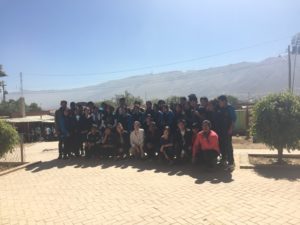During our first week, we mainly visited schools and delivered workshops on the current issue of climate change. We taught in two different environments, the first day at a public middle school, and the next couple days at two branches of Fundacion EnseñARTE Bolivia, an organization dedicated to teaching students circus skills and reinforcing material learned in school.
It can be argued that education is a valuable long term tool in improving the national economy through enhancing human capital, yet the extent of the work we have been doing does not have such significant consequences. Delivering weekly workshops to each class does not come close to improving education standards – so why did we do it?
I spoke with Andrew Parlane, a volunteer at EnseñARTE, about his experiences working with the children and teaching them circus skills at some length. Andrew studied at Cambridge University in England and picked up some circus skills in his youth for his own enjoyment; he had no intention of working with children when he arrived in Bolivia, yet he found that his passion coincided with the work being done at EnseñARTE.
EnseñARTE focuses on providing recreational activities for children, helping students pass their classes, and potentially supplement their parents’ incomes performing on the streets or in circus shows within Cochabamba. They also serve local communities by putting on free shows. However, Andrew finds fulfillment in his work in the joy and confidence the children have after performing, a thrill and a sense of empowerment they would not have had if not for their hours on hours of practice.
Marlon had a different take from his experience teaching over three hundred students in total, with indispensable help from Heather, over the week. Environmental sustainability and climate change are subjects that the older children learn in school, thus the material taught was in no way novel or life changing. However, after seeing the clearly manifested concern in the students’ faces and passion the students expressed during the workshops, particularly the younger students who were learning about environmental issues for the first time, Marlon took solace in that the students were motivated to make a difference.
This process did not go smoothly by any means, an utter and complete disaster only being averted with the help of other CECAM volunteers (thank you Emily and Jonathon!), yet it has allowed us to familiarize ourselves with the communities we will be working with through Cochabamba Pedal Project. It was not exactly the start we had expected coming to Bolivia, but meeting the children helped solidify the identities of who we are working to benefit in the following weeks to come.

